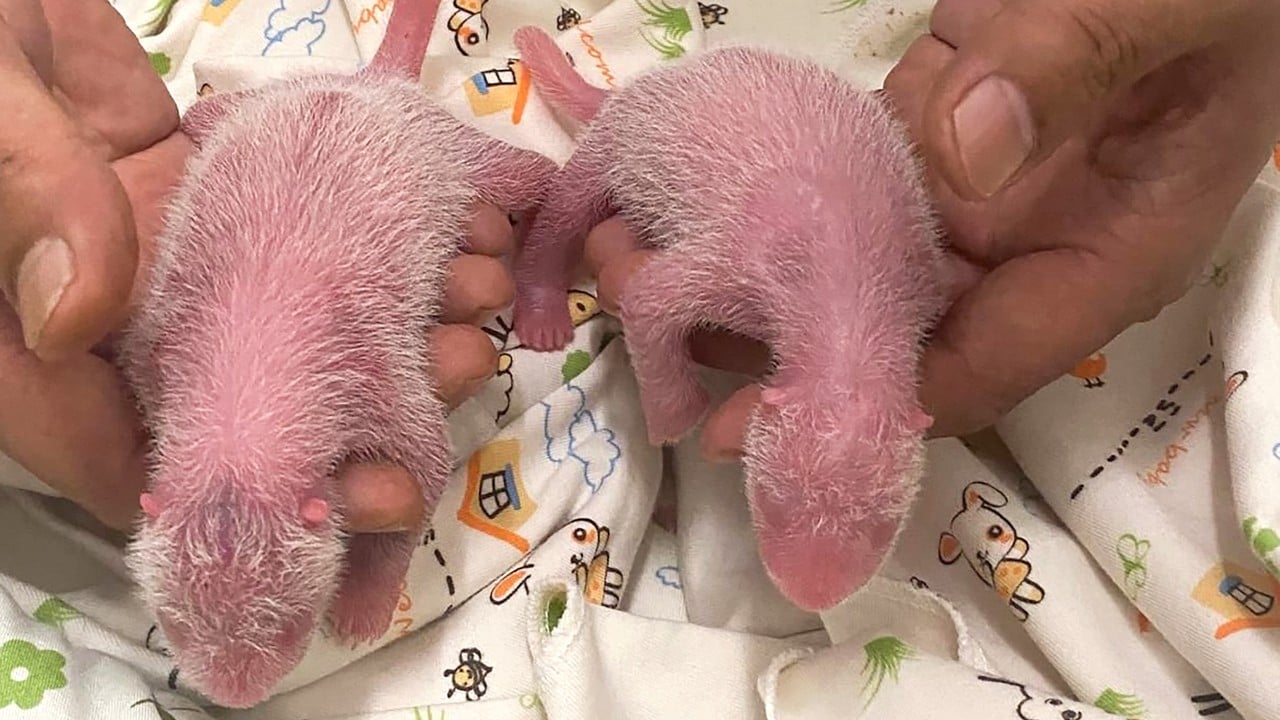Panda Watch: wiggling and sucking milk, Hong Kong’s cub twins survive first critical days after birth
Panda Watch is a weekly blog by the Post which tracks the latest on the baby panda twins – the first to be born in Hong Kong – until they are ready to meet the public.
Squealing, wiggling and sucking milk – every little movement of Hong Kong’s newborn panda twins has melted hearts throughout the week, with the oldest first-time panda mum in the world, Ying Ying, learning the ropes of motherhood.
The twins marked their one-week birthday, bringing relief to many as they navigated the most critical post-delivery period that was regarded as the most fragile time for them.
In the latest post uploaded by Ocean Park on the giant pandas’ dedicated social media accounts on Thursday, the park said the older cub weighs about 172 grams while the younger tipped the scales at around 168 grams.
“Both panda cubs are gradually stabilising on their weight, feeding and defecating,” the park wrote on Instagram.

It added that both cubs are being fed 10ml of milk powder, six times a day.
“We look forward to their next milestone when they turn completely black and white!” it said.
An earlier post on Thursday showed the pinkish younger cub was seen sprawling on a blanket with its head snuggled against a tiny pink pillow.
“Do you know what day is it today?” the caption said, with internet users noting that some black fur was starting to emerge on its back.
The Post has been tracking closely the growth of the twins – a boy and a girl – born last Thursday, just a day before Ying Ying turned 19, equivalent to 57 human years, making her the world’s oldest first-time giant panda mum.
The elder female cub weighed 122 grams at birth, while the younger male cub weighed 112 grams.
From the moment of their birth, carers at Ocean Park, including two experts from the Panda Centre in Sichuan province, have taken turns looking after the beloved new family.
The cubs have survived the first critical three to four days after birth, during which their weight would decline slightly and they remain fragile, Ocean Park chairman Paulo Pong Kin-yee had said.
On the twins’ third day, Ying Ying struggled with lactation, according to Secretary for Culture, Sports and Tourism Kevin Yeung Yun-hung. He said the park had imported panda milk formula from mainland Chinese zoos to feed the cubs.
On the following day, a nervous Ying Ying was seen tightly embracing and grooming the younger brother, as captured in a video posted by the park.
Newborn giant panda cubs cannot regulate their body temperature or defecate on their own, so Ying Ying must maintain warmth and stimulate pooping by licking them, the park explained.
Pong had said the cubs provided a fresh incentive for staff to seek out new sources of revenue and the facility would focus on ways to capitalise on the appeal of having six pandas in one place. Beijing has also gifted Hong Kong two adult panda bears to mark the 27th anniversary of the city’s return to Chinese rule.
To celebrate the birth of the two new pandas, the Park announced on Wednesday that it would offer a 15 per cent discount for its annual memberships.
Visitors who buy two or more yearly memberships will get a 15 per cent discount, with an annual pass for adults priced at HK$1,173 (US$150.49) and at HK$833 for children.
“Visit the giant pandas and other adorable animal friends as many times you like, double your fun with a wide range of members’ exclusive offers and birthday surprises,” said the park in a social media post.
As to when the public can meet the cubs, Pong said the residents would only be able to meet the baby bears “in another few months”.
Big sister’s weight: 172 grams
Little brother’s weight: 168 grams
Diet: both cubs are being fed 10 grams of milk each time, six times a day
Development: stabilising on weight, feeding and pooping; waiting for them to turn black and white


